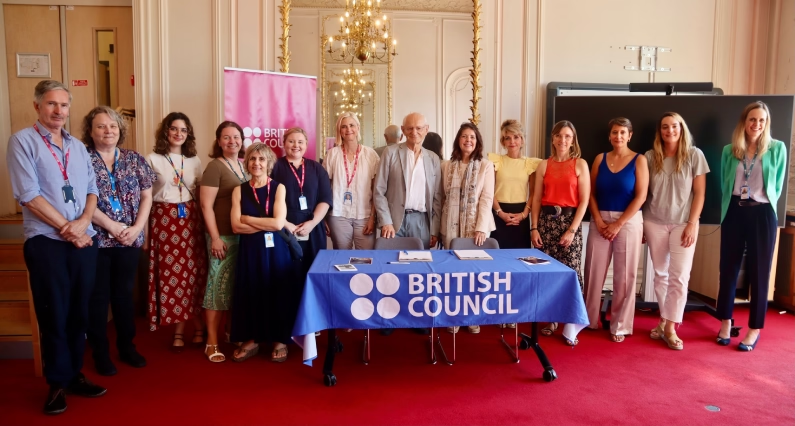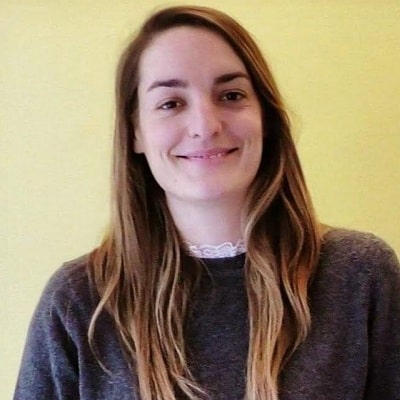To help companies improve the language skills of their employees, ORSYS, the leading provider of professional training in IT, management and business, has joined forces with the British Council, the world leader in English language teaching. This partnership has given rise to a new range of professional training courses, combining educational excellence, flexibility and innovation. We spoke to Anne Duncan, Director of British Council France, and Kirsten Hellio, Head of English Language Teaching, to find out more about this partnership.

[Interview]
ORSYS Editorial Board: How is the British Council positioned in the global landscape of English language training, particularly for professionals?
Anne Duncan The British Council is the UK's international agency, with over 90 years' experience in cultural relations, education and language learning. In France, we have been operating for 80 years and have been providing English language training for children and adults for over 50 years. We also certify language skills. We work with governments, universities and businesses to promote exchanges, while reinforcing language skills. Our strength lies in our unique cultural and academic heritage, combined with a modern, flexible and internationally recognised offering. That's why we wanted to work with ORSYS.

Our two brands, with their respective areas of expertise, create real added value for learners.
Kirsten Hellio The British Council is a world leader in English language teaching. Our mission is to promote the British language and culture. Without English today, there's not much we can do in the professional world. We invest in research, artificial intelligence, innovation and inclusive practices.
Anne Duncan : English is a lever for mobility, employability and international cooperation. It's not just about speaking the language, it's also about opening up to a new culture. It's part of our DNA.
Kirsten Hellio : Our qualifications are internationally recognised, such as IELTS or Aptis, developed in part by the British Council. But one of our greatest assets is our teachers. Speaking a language is one thing, teaching it is another. Our teachers are highly qualified, rigorously selected and continuously trained. We offer courses tailored to the needs of working people, particularly in a professional context. The knowledge acquired can be put into practice immediately. This is precisely what we are developing with ORSYS.
What motivated this partnership with ORSYS Formation?
Kirsten Hellio : What links us to ORSYS is our shared commitment to educational quality (Qualiopi certification) and learner orientation. We share the desire to meet the real needs of learners, but also those of training managers and HR directors who are looking for practical solutions to improve the skills of their teams. Our expertise is teaching and improving English. With ORSYS, we offer intensive two-day training courses, focused on very specific needs, immediately applicable in a professional context.
We also share a genuine spirit of collaboration. We want to build together, move forward together and aim for concrete results. Our objective is clear: to ensure that learners are satisfied, and that their companies are too.
This partnership is also a question of visibility and credibility. ORSYS is a major player in professional training, and the British Council a world reference in English language teaching.
Combining our two brands means combining quality, expertise and reputation.
Anne Duncan Our partnership is the best way of responding to an increasingly demanding public in a fast-changing professional world. We need to offer solutions that provide immediate value and that can be integrated into employees' day-to-day lives. Our shared ambition is to create an offering in France that meets the needs of businesses and individuals alike. This is the strength of our partnership with ORSYS.
Tell us about this new professional English training programme. What courses are on offer, and who are they primarily aimed at?
Kirsten Hellio : These courses are aimed at working professionals in all sectors. They focus on communication in a professional context, with very concrete themes: leading a meeting, giving a presentation, negotiating, managing a project.
A key point is intercultural collaboration. Communicating with a Japanese partner in English is not the same as talking to a German colleague.
Our courses are available at three levels - elementary, intermediate and advanced - depending on the skills of the learners. If you want to learn negotiation skills, you need to have an advanced level, while an elementary level will enable you to make progress in basic communication skills.
The format is two intensive days, a real mini-immersion. The aim is to improve vocabulary, grammar and oral fluency, with immediate application in a professional context.
Anne Duncan The advantage of this format is the speed with which skills can be acquired. Instead of a course spread over a year or two, we offer something very targeted, which produces visible results in a short space of time.
The future lies in focusing on a precise objective, in a short space of time, with rapid and effective results.
Kirsten Hellio Two days of immersion changes the game. Participants activate knowledge that they already had, but didn't dare use. The aim is to give them confidence and make them operational in their day-to-day professional lives.
There are many reasons to take these courses: to advance in your career, to become more efficient, to become more comfortable speaking, or to succeed in an international context. Even an informal lunch can become a difficult moment if you lack fluency in English. After two days, you'll feel more confident and think more naturally in English.
What complementarities can you identify between the teaching approaches of the British Council and ORSYS?
Kirsten Hellio : We share a common goal: to meet the practical needs of learners. These needs can be broken down into three areas. Firstly, the objectives: some come to improve their presentation skills, others to improve their overall communication. Secondly, the language level: a course must be adapted to the learner's level, otherwise it loses its effectiveness. Finally, accessibility: we want to make these courses available to as many people as possible, face-to-face at ORSYS's premises in La Défense, but also remotely, for companies in the regions. We also share the same pedagogical values: a demand for quality, listening to learners' expectations, gathering their feedback to improve our programmes, and a constant desire to innovate.
Anne Duncan Innovation is indeed at the heart of our partnership. Working together creates a positive dynamic that enables us to come up with new solutions quickly.
We can innovate faster and more effectively by combining our strengths.
This complementarity is of direct benefit to learners, who benefit from constantly evolving learning paths.
What is the added value of the individual positioning test you carry out before each course?
Kirsten Hellio The placement test is essential. A two-day course does not allow you to change levels, but it absolutely must be adapted to the learner's starting level. Let's take an example: to take a course on negotiation, you already need to be at an advanced level. Otherwise, there would be no point. Upstream testing guarantees the relevance of the course, the satisfaction of the learner and that of the training manager or HR director who invests in the training. We have chosen a simple, accessible format: an online test of around fifteen questions, which the learner completes remotely. This enables us to place them in the group that corresponds to their level. The result is more beneficial training, learning with confidence and immediate application.
What concrete benefits can participants expect from this course in their day-to-day professional lives?
Kirsten Hellio : The first benefit is to gain confidence in speaking. Participants develop their ability to present, negotiate and communicate with international clients or colleagues. At the end of the course, each participant receives a certificate co-signed by ORSYS and the British Council. This is official recognition of their achievements. Let's be realistic: in two days, you don't progress an entire level. But what we do see is that participants activate knowledge that they already had without using it. They come away feeling motivated and at ease again. Our aim is to get them going. To think in English, to dare to speak, even with mistakes. It's this confidence that makes the difference in their professional lives.
How can these courses help you to better manage communication in an international environment?
Kirsten Hellio : These courses develop a key skill: interculturality. This involves learning to adapt one's language and communication style to the person with whom one is speaking. Learners acquire a vocabulary adapted to their sector - IT, finance, sales, etc. - and learn to express their ideas clearly and concisely. Being concise and precise makes for more effective exchanges, avoids misunderstandings and boosts professional credibility. Many of our learners are experts in their field, but struggle to make the most of their skills in an international context. Our aim is to give them the means to fully express their expertise in English, both orally and in writing. We always work on grammar and correct language errors, but always in a real context. That's what makes learning immediately useful.
What initial feedback have you received from the sessions already open for registration?
Kirsten Hellio : We organised our first training course in June and other sessions are already scheduled for the autumn. There's a real interest, particularly for courses focusing on communication and meetings, because these are universal needs in the professional world. The feedback has been very positive. The participants appreciated the quality of the discussions, including the informal moments such as lunch with the trainer. At the end of the second day, many of them reported a significant gain in confidence. They dared to speak out more, which is exactly the objective. These initial results confirm that we have designed an offer that is tailored to market expectations.





